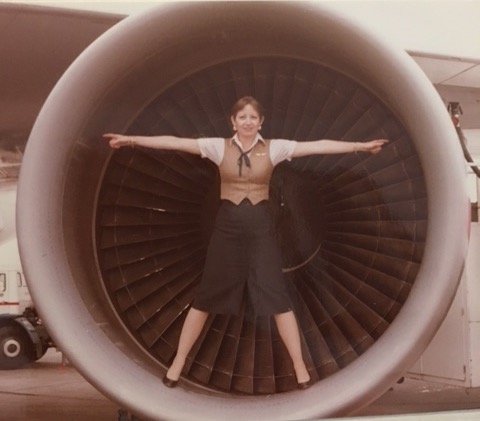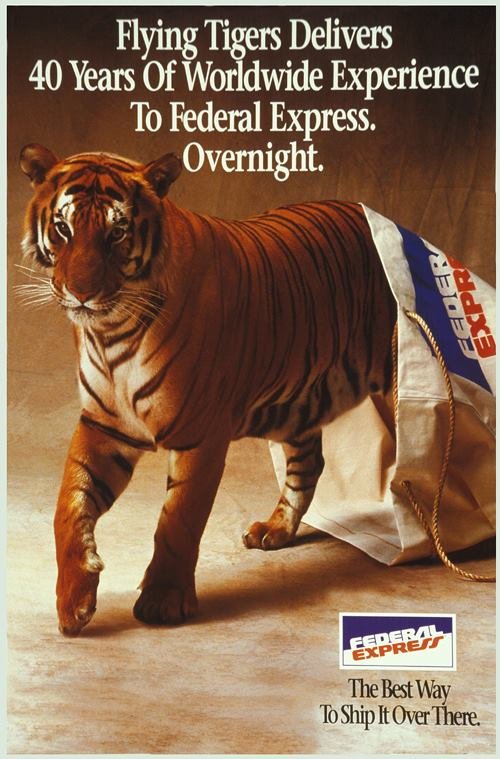The flight attendant down the street

San Francisco, California
I’M JUST AN ORDINARY PERSON. I never thought of becoming a flight attendant. I assumed you had to be 5 feet 10 inches tall, drop dead gorgeous and speak five languages. I was none of those things.
I wish I had found my passion at an early age, been one of those children who knew what they were going to be when they grew up. Instead, I bounced around, dropping in and out of college, never quite finding my perfect fit whether it was an interesting job, a cute apartment or a handsome boyfriend.
In January, 1980 I saw a classified ad in the San Francisco Examiner newspaper that would change my life. My parents subscribed to both the San Francisco Chronicle, delivered in the morning, and the San Francisco Examiner, delivered in the evening. Searching for a job, I only read the classifieds in the Chron because it was a highly respected newspaper and had a larger circulation. For some odd reason, that evening I idly scanned the want ads in the Examiner.
I was staying with my parents, having just returned from a three-year stint living in Israel. At the age of 21, I had moved halfway around the world to a foreign country that intrigued me, where I had never been, knew no one and did not speak the language. I originally went for 6 months on a work/study program to fulfill a requirement for my university major, Middle Eastern Studies. I had to learn Hebrew or Arabic as part of the major so I decided to learn both. I went to Israel to live and work on a kibbutz (a collective farm of sorts), study Hebrew and get a head start on courses I would be taking at the University of California, Santa Barbara. I loved Israel so much, I stayed three years.
The ad in the newspaper that evening read “Flight attendants needed for government contract flights to the Far East. No experience necessary. Equal opportunity employer. Send résumé to PO Box – -.” It looked like a recruiting ad for the military couched in appealing terms, but I thought, “Why not?” and sent off my résumé.

Hearing nothing from this mysterious prospective employer, I took a job with two Israeli diamond dealers in San Francisco. I managed their office, answered their phones, handled their correspondence and occasionally signed for shipments of innocuous little light blue boxes, sealed and stamped securely along every edge, thousands and thousands of dollars worth of diamonds nestled discreetly within.
Sometimes the Israelis would call me over and show me a diamond with a big flaw in it. “It looks like scrambled eggs!” they’d exclaim, and hand me the jewelers loupe to put up to my eye, but I never could see very much through the little magnifying lens.
One day I received a phone call. It was Flying Tigers and they wanted to interview me. I had no idea who they were, had never heard of such a company and thought, did I apply to the circus?? The woman on the phone reminded me I had sent them a résumé and they would like to meet me.
“I already have a job,” I stuttered, caught off guard. Luckily, the voice on the phone persisted and told me they were having a group interview for flight attendants and would like to extend an invitation to me. “Well, okay,” I said hesitatingly, like I was doing them a favor.
I went to the interview at the Grosvenor Hotel near the San Francisco airport. Flying Tigers was a charter airline that had just been awarded a large contract to bring refugees to the United States from refugee camps all over Southeast Asia- Bangkok, Manila, Kuala Lumpur, Singapore- via Hong Kong. “Boat people” they were called, thousands of people who fled Vietnam by sea after the war, desperate for a chance at freedom and a better life, languishing for years stateless, homeless, displaced, in camps overseen by the United Nations located in any country that would take them.
Flying Tigers also had a huge contract taking military troops and their families to military bases all over the world. Tigers, however, was best known as the premier airfreight airline in the world, famous for transporting animals (pandas and orangutans to the zoo; Shamu to SeaWorld; racehorses to the track) as well as all manner of cargo large and small.
The interview didn’t go that well. After participating in the group session with 50 would be, wanna be, can I be, hire me, flight attendant hopefuls, it was one-on-one, just me and an interviewer sitting across from each other. Judy asked about my experience living in Israel. I talked about how wonderful it had been, such an amazing place, the people so friendly, and then Judy looked at me darkly. “I got robbed in Israel,” she said. I quickly murmured something sympathetic, clucking my tongue, all the while figuring, there goes any chance of getting hired by her! I left thinking I really, really want this job. It satisfies my need for variety plus I’ll travel and get paid to do it!
Despite the awkward interview- and to my great surprise- Flying Tigers hired me. That was the start of a 35-year, two airline adventure, spanning six continents and 105 countries.

May 1980. 2300hr (the 24-hour clock used in aviation, 11 p.m.) and I am driving to San Francisco International Airport to work my very first flight. The toll taker on the Golden Gate Bridge (back then the occupant of the tollbooth was a living breathing person who took your cash and gave you change) said to me, “You’re in a good mood tonight!” I exuberantly replied, ”I’m going to BANGKOK!” That was just the beginning…
Fast forward 12 years. My job at Flying Tigers has come to a crashing, burning, screeching, glass breaking, metal scraping, thudding halt. FedEx, then a domestic cargo airline specializing in overnight delivery, bought Tigers specifically for our landing rights (permission granted by a government to fly into an airport) into Narita, Japan, a lucrative port of entry for international airfreight. At that time, Japan was not granting landing rights to any airline with whom they weren’t already doing business. FedEx desperately wanted to expand and go global, and purchasing Flying Tigers was the way to accomplish that.
For three years, FedEx continued the existing military charter until the contract was fulfilled. For three years, Tiger flight attendants wore FedEx wings and sported purple and orange uniform pieces in the colors of FedEx. For three years, we were reassured our jobs were secure, promised a new uniform, treated like valued employees. A uniform committee was formed, but their ideas and designs were continually rejected. Suddenly, with four months’ notice, we were told, “We don’t want you, we don’t want passengers, we want overnight mail.” On October 6, 1992, I was standing in the unemployment line, asking “What happened?” It was over.
Heartbroken, I didn’t know what to do or where to go. A job I loved had been taken away from me. For 12 years, I never once called in sick, never didn’t want to go to work, never thought about doing anything else. It wasn’t just the loss of a job- it was the loss of a close-knit group of friends, a social circle, a community, a way of life. Two hundred and fifty flight attendants who knew everything about each other- the names of husbands and cats, newborn babies and elderly parents. We shared triumphs and disappointments, advising and admonishing each other with “jumpseat therapy”, conversations and confessions held on flight attendant jumpseats out of the earshot of passengers. We were family! I wasn’t ready to give this up.


I went running to Delta, where I stayed for 23 years (but more about that later).
I had stumbled unknowingly into an extraordinary career that for a total of 35 years would take me around the world working (on their time) and traveling (on my time), would give me amazing experiences I didn’t know existed and would introduce me to people I never thought I’d meet, people who would shape me, change me, mark me, and forever be a part of my life.
Passengers on airplanes have no idea the impact they make on the flight attendant who seats them and serves them. I’ve laughed and cried with my passengers. I’ve honored them, remembered them, will never forget some of them. Now I’m sharing these stories with the world.
This is my narrative and these are my adventures.
